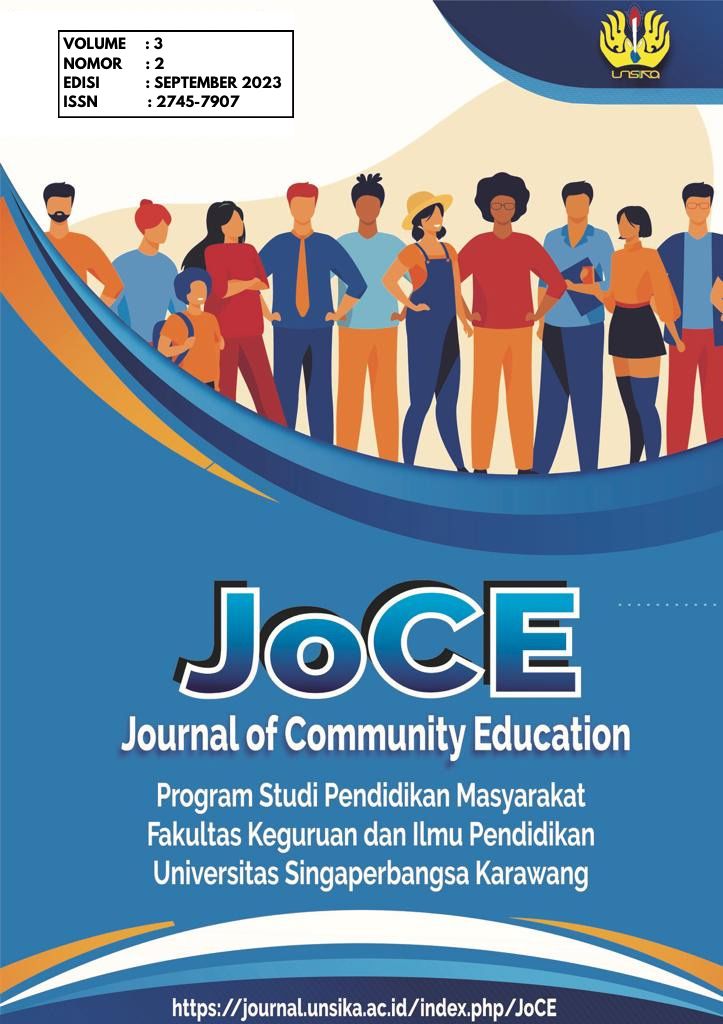EVALUASI PROGRAM PENDIDIKAN KEWIRAUSAHAAN PKBM BINA INSANI
Abstrak
Life skills or life skills as a skill that is learned by a person to do something well that can improve the quality or standard of his life. Entrepreneurship education at PKBM Bina Insani Bandung as a solution that can be applied in the scientific field. Entrepreneurship education is a training process for students to face an uncertain future by providing the ability to create businesses. The research method used is a qualitative research method. Data collection techniques used by researchers are interviews, observation, and documentation studies which refer to evaluation with the CIPP model design (Context, Input, Process, Product). The results obtained are that this program has achieved quite well in evaluating the context, input, process, and product but of course it cannot be separated from existing deficiencies. The conclusion in this article is that the program is running quite well in context, input, process and product, and PKBM Bina Insani can solve existing problems quite well.
Keywords: Entrepreneurship Education, Program Evaluation, CIPP Model
Life skills atau kecakapan hidup sebagai suatu keterampilan yang dipelajari oleh seseorang untuk melakukan suatu hal dengan baik yang dapat meningkatkan mutu atau taraf kehidupannya. Pendidikan kewirausahaan di PKBM Bina Insani Bandung sebagai solusi yang dapat diterapkan dalam bidang keilmuan. Pendidikan kewirausahaan ini sebagai proses pelatihan bagi pelajar untuk menghadapi masa depan yang tidak pasti dengan memberikan kemampuan kemampuan penciptaan usaha. Metode penelitian yang digunakan yaitu metode penelitian kualitatif. Teknik pengumpulan data yang digunakan peneliti yaitu wawancara, observasi, dan studi dokumentasi yang mana merujuk pada evaluasi dengan rancangan model CIPP (Context, Input, Process, Product). Hasil yang didapatkan yaitu program ini memiliki ketercapaian yang cukup baik dalam evaluasi konteks, input, proses, dan produk namun tentu tidak terlepas dari kekurangan yang ada. Kesimpulan pada artikel ini ialah program berjalan dengan cukup baik dalam konteks, input, proses dan produk, serta PKBM Bina Insani pun dapat menyelesaikan permasalahan yang ada dengan cukup baik.
Kata Kunci: Pendidikan Kewirausahaan, Evaluasi Program, Model CIPP
Unduhan
Referensi
A, Moch Yogi, and J Jamaaluddin. “Pentingnya Pendidikan Kewirausahaan Dalam Mendukumg Pertumbuhan Ekonomi Negara.”
Adeel, Shahzada, Ana Dias Daniel, and Anabela Botelho. 2023. “The Effect of Entrepreneurship Education on the Determinants of Entrepreneurial Behaviour among Higher Education Students: A Multi-Group Analysis.” Journal of Innovation and Knowledge 8(1): 100324. https://doi.org/10.1016/j.jik.2023.100324.
Hakan, Karatas, and Fer Seval. 2011. “CIPP Evaluation Model Scale : Development , Reliability and Validity.” Procedia - Social and Behavioral Sciences 15: 592–99. http://dx.doi.org/10.1016/j.sbspro.2011.03.146.
Hasan, Hurriah Ali. 2020. “Pendidikan Kewirausahaan: Konsep, Karakteristik, Dan Implikasi Dalam Memandirikan Generasi Muda.” Jurnal Pilar: Jurnal Kajian Islam Kontemporer 11(1): 99–111.
Johnstad, Judit et al. 2023. “ScienceDirect ScienceDirect ScienceDirect Entrepreneurship through Sustainable Value Creation Project Introducing Economy International Exploring / HCist Circular Entrepreneurship Education through Sustainable Value Creation – Exploring a Project Introducing Circular Economy Entrepreneurship Education through Sustainable Value Creation – Exploring a Project Introducing Circular Economy.” Procedia Computer Science 219: 1920–29. https://doi.org/10.1016/j.procs.2023.01.491.
Krisdayanthi, Astrid. 2003. “Menumbuhkan Jiwa Kewirausahaan Pada Aud Sebagai Bekal Kecakapan Hidup.” : 20–27.
Kurniawan, Dhani. 2013. “Konsep Dasar Kewirausahaan Dan Proses Kewirausahaan.” Media Neliti 216: 81–96.
Magfirah. “Analisis Pendidikan Dan Pelatihan Kewirausahaan Dalam Perspektif Keterampilan Abad 21.” 21.
Malang, Universitas Negeri. 2017. “CONTEXT INPUT PROCESS PRODUCT ( CIPP ): MODEL EVALUASI.” : 342–47.
Pendidikan, Dalam. “Peran Kewirausahaan Dalam Pendidikan.”
Prasetyo, Iis, and Entoh Tohani. 2013. “PENGEMBANGAN MODEL PENDIDIKAN LIFE SKILLS BERBASIS KEWIRAUSAHAAN MELALUI EXPERIENTIAL LEARNING.” 8(2).
Rivo-López, Elena, Jesús F. Lampón, Mónica Villanueva-Villar, and Carla Míguez-Álvarez. 2022. “The Impact of Visual Narrative Formats on Women’s Entrepreneurship Training.” International Journal of Management Education 20(2).
Santana-Domínguez, Iván, José Luis Ballesteros-Rodríguez, and Carmen Domínguez-Falcón. 2022. “An Application of Training Transfer Literature to the Analysis of Training for Entrepreneurship: A Conceptual Model.” International Journal of Management Education 20(2).
Singh, Diwakar, and Richa Awasthy. 2023. “ScienceDirect Lokasamgraha : An Indigenous Construct for Social Entrepreneurship.” : 1–15.
Sobari, Indra Sumarna. 2020. “Membangun Jiwa Kewirausahaan Di Era Milenial Bagi Ahasiswa Institut Stiami Kampus Tangerang Selatan.” 2(2): 140–44.
SOMEONE. 2019. “KAJIAN TEORI Evaluasi.” : 9–33.
Tuna, Hakan, and Melek Başdal. 2021. “Curriculum Evaluation of Tourism Undergraduate Programs in Turkey: A CIPP Model-Based Framework.” Journal of Hospitality, Leisure, Sport and Tourism Education 29(October 2020): 1–9.
Wahida, Khoirunisa. 2023. “Efek Globalisasi Yang Dihadapi Masyarakat Kontemporer Terhadap Perekonomian.” 1(1).
Walmsley, Andreas, and Birgitte Wraae. 2022. “Entrepreneurship Education but Not as We Know It: Reflections on the Relationship between Critical Pedagogy and Entrepreneurship Education.” International Journal of Management Education 20(3): 100726. https://doi.org/10.1016/j.ijme.2022.100726.
Xiaobao, Peng, Chen Hongyu, and Emmanuel Mensah Horsey. 2023. “Acta Psychologica The Predictive Effect of Relative Intuition on Social Entrepreneurship Orientation : How Do Exploratory and Exploitative Learning and Personal Identity Interact ?” Acta Psychologica 237(May): 103951. https://doi.org/10.1016/j.actpsy.2023.103951.
##submission.downloads##
Diterbitkan
Cara Mengutip
Terbitan
Bagian
Lisensi
Hak Cipta (c) 2023 JoCE (Journal of Community Education)

Artikel ini berlisensiCreative Commons Attribution-ShareAlike 4.0 International License.




